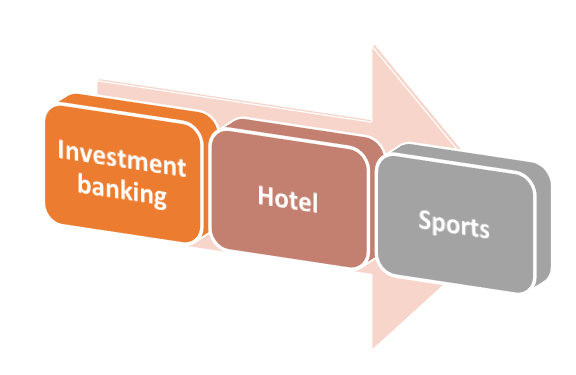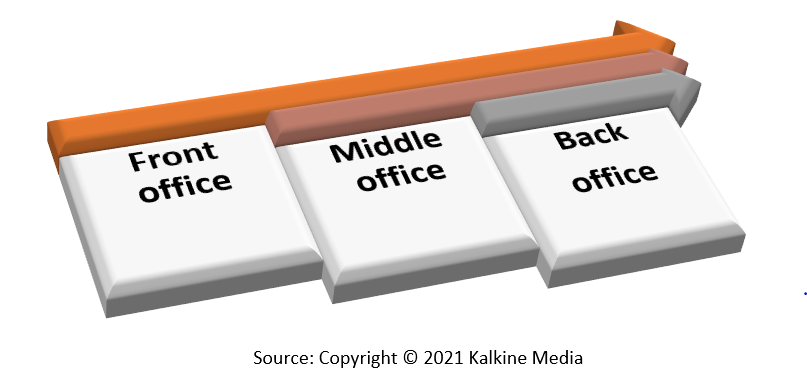What is the front office?
The customer-facing department of a firm is known as the front office. Customer service, sales, and industry specialists who provide advisory services, for example, are called front office functions. The front office tasks typically generate most of the company's revenue.
Individuals and professionals with an in-depth understanding of the business are typically found in the front office of a firm, as they provide advisory services to the firm's clients and respond to visitor queries.
Summary
- Customer-facing personnel, such as those in the sales, marketing, and service divisions, often make up the front office.
- The front office oversees producing the majority of the firm's revenue because it has the most direct interaction with clients.
- Many companies' operations are separated into three sections on a conceptual level: the front office, the back office, and the middle office.
Frequently Asked Questions (FAQs)
What is the origin of the term "front office"?
In the early 20th century, the term "front office" was first applied in law enforcement. Those involved in unlawful activities or convicted of crimes referred to the leading detective bureau or main police office as the "front office" since it was the most crucial law enforcement organisation in the area.
By the 1930s, the phrase "front office" had evolved to refer to the most important employees in a corporation, such as executives and managers.
The front office of most firms serves as the sales and reception area. Front-desk employees are usually the ones who have the most interaction with clients.
On the other hand, front-office personnel is often those professionals who produce income for the organisation by providing direct client services, such as wealth management, in the financial services industry. Depending on the business, a company's front office professionals, such as receptionists, may be among the lowest-paid employees.

Source: © Master1305 | Megapixl.com
What is the front office's function?
The front office of a financial company is responsible for functions such as:
- Mergers and Acquisitions
- Trading
- Sales
- Advisory
The front office of a firm is the most visible part and client-facing component of the organisation. It contains responsibilities that focus on functioning for clients rather than in support, compliance, risk, or operations.
The term front office derives from the fact that, in the past, client-facing employees would work in the front of the business, where they could be seen, while support staff working behind them in the back.
Moreover, front office roles are typically revenue-generating, and they can be regarded as the link between clients and outside and inside roles.
For example, two buy-side businesses may engage through an investment bank's sales team, while front office bankers interact with both support employees and clients, facilitating information flow. The front office of an investment bank is typically the most difficult to break into, but it also offers the most pleasing salary and exit prospects.
The most active front offices are the sales and customer service departments. Typically, a firm's front office performs better with the help of the back office and middle office.

Source: © Arne9001 | Megapixl.com
How does "front office" fare in various industries?
In other industries, such as investment banking, sports, and hotels, the phrase "front office" has a more specific meaning.
Investment banking
The front office is a term used in investment banking to denote a revenue-generating position. Markets and investment banking are the two key areas of specialisation in the front office.
Investment bankers help companies with mergers and acquisitions (M&A) and a variety of capital-raising tactics. Individuals who work in a market-type job at an investment bank's front office conduct research or sell and trade securities.
Hotel
In the hotel sector, the front office refers to the space where guests first arrive at the hotel, also known as the reception area.
A receptionist often works in the front office and is responsible for contacting customers, answering their queries, and confirming their reservations.
Sports
The front office of a sports organisation employs a wide range of sports industry personnel, from the team's owners to ticket sales offices and general managers.

Source: Copyright © 2021 Kalkine Media
What are the distinctions between front office, back office, and middle office?
Front office
- A company's front office oversees direct communication with present and potential consumers.
- In the front office, you'll find the sales and marketing
- The front office's primary task is to produce money and increase sales profits.
- The front office assists in the development of a plan for capturing new business.
- The front office strives to develop new business through generating new deals.
- Employees in the front office get more money than those in the back office because they are the ones that produce revenue for the company.
Middle office
- Before the back office reconciles the front office's transactions, the middle office monitors and processes them.
- The middle office oversees corporate strategy and risk management.
- The middle office ensures that a firm stays afloat while adhering to legislation and following ethical business practices.
- The middle office arose because of the growing complexity of today's financial transactions.
- It consists of employees, including information technology officers, risk managers, and other officers who manage information technology and risks within the firm.
Back office
- The company's clients have no communication with the back office.
- The warehouse, admin, HR, finance and accounting, and other departments are in the back office.
- The back office’s responsibility is to reduce the company's overall costs.
- The back office is in charge of analysis, technical, and administrative support.
- The back office concentrates on the production of products and services.
- Employees in the firm's back office are paid less than those in the front office.

Although front office staff may believe that they are performing the most vital duty, the reality is that they are significantly reliant on the operations of the other two sides, as they ensure that all processes, whether HR, admin, or IT, run well.
Furthermore, the duties of several back-office functions have increased rapidly over time. Previously, its role was primarily limited to hardware, but currently, the IT team in investment banks consists of professionals who develop crucial technical infrastructure that supports the essential operation.
 Please wait processing your request...
Please wait processing your request...